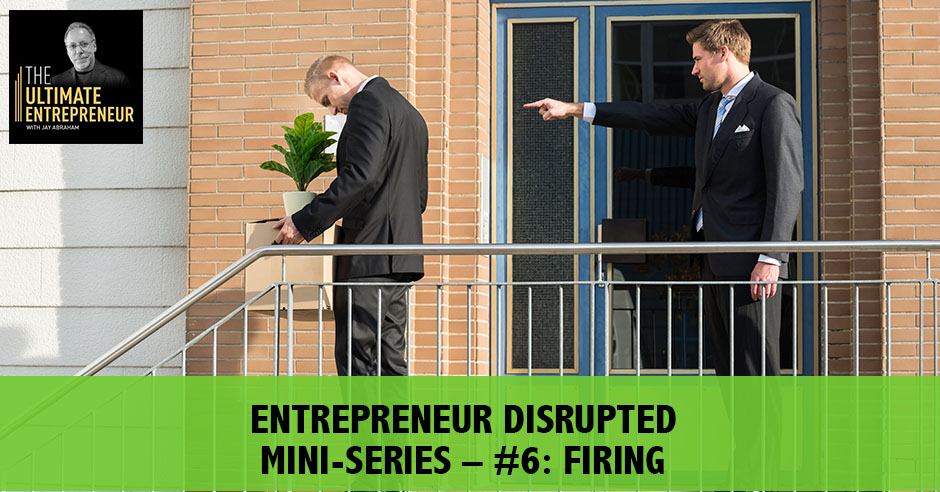Entrepreneur Disrupted Mini-Series – #6: Firing


Firing is an essential part of business that often gets delayed by entrepreneurs. In #6 of Entrepreneur Disrupted, we discuss how firing with compassion is possible with Jay Abraham, one of Forbes’ Top Five Executive Business Coaches in the world. Jay talks about the obstacles and challenges that will be met with firing, realizing when someone is no longer pulling their weight in their job, all with hard-earned, real life lessons acquired from many years spent growing, collaborating, and regrouping in the industry. Learn how adopting these beliefs systems will save you countless hours and will avoid, eliminate or at least mitigate an enormous amount of suboptimal performance by your company from your growth trajectory. When done properly, firing can allow you to lead yourself and others to greatness in a much more efficient, and strategic way. Nothing of worth ever comes easy!
Listen to the podcast here:
Entrepreneur Disrupted Mini-Series – #6: Firing
I’m conducting with Bulletproof’s Dave Asprey on The Ultimate Entrepreneur Podcast where we’ve taken it upon ourselves to arm you with the tools, knowledge, and lessons that are going to take your business adventures to heights you’ve never fathomed possibly before. In the past episode, Dave and I discussed the fundamentals of the hiring process. We shift dramatically our focus towards firing. When, how, and why to do it? This is an essential part of business that oftentimes gets overlooked, procrastinated, equivocated by starting entrepreneurs and when it is done, it can be ugly. Dave and I don’t hold back at all as we get into the obstacles and challenges that will be met with firing, realizing when someone is no longer pulling their weight and providing the valuable contribution the job requires and most importantly firing with compassion and how the act is beneficial not only for you and your business, but for that employee you fire as well.
This is a killer episode with values, belief systems, and distinctions that should be taken deeply into consideration and evaluated thoroughly because this will become an ongoing part of any growth business. What Dave and I share are hard-learned, real life lessons acquired from our many years in the industry growing, collaborating, regrouping. I truly hope you pay it engine as adopting these beliefs systems will save you countless hours and will avoid, eliminate or at least mitigate an enormous amount of suboptimal performance by your company in your growth trajectory. This should allow you to lead yourself and others to greatness in a much more efficient, effective, strategic way. Please enjoy and take everything we share with you to heart because the scenarios will occur and the larger you grow, the more success you enjoy, the more critical these elements are to understand and master.
I’m Dave Asprey, the Bulletproof Executive and here with Jay Abraham. Jay is one of the Top Five Executive Business Coaches in the world according to this little magazine called Forbes. He’s got a lot to teach you and me in our podcast. We’re going to talk about when to fire and when to hire, which is something that most entrepreneurs, especially as we’re getting a company started probably don’t do well. Either one of them, we probably don’t do it right and we probably don’t do it at the right times. We’ll both share some stories about things that worked and didn’t work. Jay, what do you think? Let’s talk first about knowing when to fire. When do you fire someone?
I answer with basis because I’ve been influenced by much brighter thinkers than myself on this. One of the brightest men I know who runs strategy for the largest private equity firm has a belief, you hire slowly and you hire based not just on professional skills but on a whole dimension of other criteria, but you fire very quickly for the betterment, not just of the company, but that person because you’re not helping somebody who’s not adding value, continue not adding value. You’re actually an enabler.
Most early stage entrepreneurs I’ve worked with and including me at various stages in my career, we go through this thing, ” I got a warm body.” Warm bodies are great because they get something done. I’m thinking back to this company that grew from 300 employees when I joined and the business unit that I was helping to start, there was basically three of us as entrepreneurs. We grew our business unit to about 1,500 people and the whole company went from 300 to 5,000 people over the course of probably two or three years. It was an incredible time to learn all the stages of growth in a company like that. This was a time though where I remember I had lunch at a local place there in Santa Clara. This guy came up and I had a couple of lunches with him just someone I met. I realized that he was like playing the long game as an Amway distributor. He was trying to loop me into some MLM scam thing. I’m like, ” That’s just slimy. Don’t waste my time.”
Six months later, one of the partner companies, a storage company, actually this guy was their director of business development, had gone from literally like hitting up people at restaurants to try and get them to buy toothpaste at a discount to directing business development at a company with $50 million in venture backing. This was a case of warm bodies. We did this also at excess where like if you’re going to grow at that rate, you got to get butts in seats. The problem is, as you do that though it tweaks on the culture and when you’re dealing with just early start with three people in the company, even if one of them is pretty horrible, at least they’re getting stuff done because that overwhelm happens when you’re not like, “I can’t do that anymore because I’m doing other entrepreneurial stuff.”When do you recommend people? People sit down and say, ” I need to get rid of that person even though they’re doing some valuable work because they’re either doing it wrong, because they’re not accurate or because they’re a jerk.”Do you just do that right away even though you thought it’s going to disrupt your business? There’s an inherent tension and a fear that most people have that results in mean people sticking around.
Let me give you a caveat or an exclusion to what I just said. There’s a very high incidence among small medium entrepreneurs of what I’ll call external projected delusionary thinking. They’ll say, “I can’t hire any talent,” and what really they’re saying is, “I want to hire $200,000-people and pay them $32,000 with no upside and no vision of a future or any growth.”What they’re really saying oftentimes is, “I don’t have the time or the ability to take the time to define and explain our creation basis, our vision, our growth, and why it’s going to be meaningful. I don’t have the time to explain how their job will interact.”Or they’re saying, “I don’t have the interest in investing either time or money in training to make them better.” The first thing I would say most is, ask yourself privately or if you have the chutzpah, ask whatever, if you have no team, your spouse, if you have no spouse, a man on the street. Somebody that knows you, a good friend or a colleague and figure out first, assuming, which I think is a very diluted assumption that you can answer positively to all those which I don’t think you can, and if you’re not culprit, then you need to do two things. There’s a double question here. There’s competency, there’s incompetency, and there are strengths and weaknesses.
Before you terminate somebody, the right question is and presuming you can cash flow it, “Would their maximum skill set being utilized on a different role be an asset?”A lot of people basically throw the baby out with the bath water. Let’s say I’m really great on organization, but I drive people crazy. Is there a place that that can function in more of a less volatile or vice versa? I’m really good. We have somebody who’s really good on the phone with relationship building, but we have to be judicious in making certain that the collaborative part of her, the aggressive collaborative part of her rather than non collaborative part of her, so I’m going to give you more than you want. The other one is, if they just absolutely don’t get it or don’t have it, as long as it’s not really the fault of you for not giving it, showing it, teaching it, connecting it, this is gross as can be, but I had an infection in my foot and I went overseas and they didn’t take care of it and it got flesh-eating bacteria and I almost lost my foot. Had I taken care of it at the moment, it would’ve been a very meager inconvenience and some antibiotics, but I procrastinated and that’s all I can say on it.
If I’m getting this right, we want to avoid flesh-eating employees? No zombies.
Yes. Unless they’re really interesting and then you got to be able to keep them at a bay.

Entrepreneur Disrupted: It’s actually painful to fire someone. It’s hard to do it and if you like firing someone, there’s something wrong with you.
Everyone knows at a startup and including the entrepreneur, like I’m getting X out of this person, but it’s not working and that’s where it comes down to the cultural fit and teamwork and all that. There isn’t a quantified analysis that’s going to tell you that’s happening. There are quantified analysis, things you can do before and during the hire that help you avoid that happening. I am spending a lot of my own energy now looking at these interviewing techniques to make sure that I do a better job of finding that. Every entrepreneur that I know of who is new to the game, will make this mistake of saying, “I want to save this person.” Then they invest undue time and attention and huge amounts of stress focusing extra resources on someone who isn’t performing. It’s actually really painful to fire someone. It’s hard to do it and if you like firing someone, there’s something wrong with you. Unless the person you like firing actually really deserved it that much and then I could see you having a sense of relief when you’re done. The actual act of doing it, it doesn’t feel kind.
However, for the people who are on mission and are executing and are part of the team, it’s actually an act of kindness for them. Someone explained this to me. If you were dating someone and it wasn’t working, would you keep dating them for a long time? Here’s the answer. If you’re afraid of being alone, you actually will keep dating them. We call that co-dependence. If you’re willing to be alone and figure out, “I can get some other date,” then you’re going to say, “I’m sorry.” Even though like maybe it’s good in bed, but the rest of the time I hate my life, so like, “We’re not going to date anymore. It’s over.”That sense of control of your life, you’ve got to take that from what you do outside the business, into the business and if you have employees who simply aren’t doing it at any stage of the company, even if it’s firing a co-founder or something, you’ve got to do it. It sounds to a lot of people when they hear stuff like that, it sounds mercenary or mean or cold hearted. It’s actually about showing compassion for the people who are on mission.
If you make them stress themselves and bend over backwards for someone who’s not doing it, it’s better to get that out of there. There may be times you’re like, “That’s not going to happen for two or three months because I’ve got to create a transition plan.” Then it comes down to, “Are you good enough to hire?” I think a lot of people still make that mistake where they say, “It’s just going to take me three months to replace this person,” but it’s actually going to take nine months to replace that person. For nine months, that person slows down organizational development. Here’s the kicker that I did not understand until I’ve done this for awhile. The person who doesn’t fit, they’re just as miserable as everyone else. They’re sitting there going, “I really need this paycheck.” I’m just going stick. I’m going to do my best but like I hate my life and I’m stressed and I can’t sleep, and I got ulcers.
Help the person find something that they love because it’s not what you’re doing and help everyone with you work with someone who they can love because then everybody wins. That’s the mindset that I have now when it’s time to let someone go and it’s never fun. It never feels good. I have been surprised at the number of times where they’re like, “Really? I was about to quit. Thank you.” That’s so good. I’ve had this happen a couple times in my career too. My last job before I went full time Bulletproof, I was at a big technology, a computer security company, and I was in charge of global evangelism person for cloud security. Technology evangelism is really hard because you got to get people excited about boring stuff. It’s a very challenging playing field and my biggest action on it was to create a new category the Gardner and IDC would recognize called cloud security. I was executing pretty well in my job according to the metrics that we were tracking. I was getting to the point where I just had conflicts with Bulletproof.
CNN wanted me to be on to talk about modafinil and to talk about Bulletproof coffee. That got me 100 times more media than I ever got showing up on other news networks talking about computer security. There’s this inherent like, “Do I talk about butter or do I talk about viruses?”I chose butter. I was in this position where I was ready to call the company and I had chosen to ditch a business dinner to go have a Bulletproof conversation with someone on the Bretton Woods Council, which is a very influential group. I’m like, “Sorry. This is just more important.”I was ready to turn in my notice and I get the call with the human resources person on the phone. They were expecting me to be a little upset because I had executed really well, but there are some internal political changes in. There was a new guy that’s going to take over evangelism. However, I was like, “Thanks. This is awesome. Now, I get a severance package.” It’s amazing.
The HR person said, “Dave, this is the easiest call I’ve ever had in my career.” I’m like, “Your timing couldn’t have been better.” Literally, I was going to go on vacation and come back and quit. There that was an extra six weeks of salary that gave me a little bit of a safety buffer when I went over. You may have this happen if you’re an entrepreneur and you’re going to let someone go. I guarantee you, if it’s not working out for you, they’re already looking. They’re already trying to do it, and if they’re not already looking and it’s not working out, you’ve probably got to fire them. Because if they’re too afraid to look when they know it’s not working, they need to do a lot of personal work before they’re going to fit in on a high performance team. This is how it is. It’s like they’re going to win and you’re going to win no matter what, and when I got that, even if it hurts, now it’s ripping off the bandaid. That’s an area where just letting people go is an act of kindness.
First thing I want to know is when you were the global evangelist, did you get people to tithe?
Get people to tithe? What you don’t know, I was actually one of the Top 100 Most Influential Writers on Cloud Computing at the time and I was doing all this stuff, but there’s an audience of 10,000 people who really care about cloud computing.
There’s a couple of belief systems that one of my mentors always said, “Hire the best and cry only once, but you have to know what the best means because it’s a very amorphous and dynamic sort of a definition.” Number two, is this friend of mine, he was for years the Chief Strategic Advisor to a company that owned parts and even markets, CAA, 5-hour ENERGY, oil firms, very big company. They would send in pre any acquisition to spend time with the CEO and the team because his purpose was not just to judge the business but to judge the people. He would do things that were very beyond typical, just superficial. That’s one thing. The second thing is I have a fabulous interview I did of him that was torqued down for entrepreneurs that I’ll be glad to put up. I also had an interview we did a while back, but I think it’s still relevant with Geoff Smart of Topgrading, which is interesting and provocative.
At the end of the relationship, if you can’t grow them or repurpose them, you realize this is somebody’s total life. When you hire somebody, even if it’s the secondary income spouse or a significant other, they’re looking for you to be their future, their fulfillment. They’re investing in you whether usually I’m paying them and you have to look at it as a double reality. At the end, I have found in my life there is a wild ladder where people come back into your lives either in a very positive or very negative ways. If you can add value at the end, whether it be, recommend them to something else, pay few if they justify it for either a training or a give them a training program, they wouldn’t buy. You can buy Nightingale-Conant great programs for $60. Do something so noble that will help them move to a better place. Give the Kolbe test. One other thing, and it’s the last thing that I will add is that I have a smaller company. I used to have a much larger one and I never got involved in any of this.
What we do now because we don’t want to be responsible for screwing up somebody else’s life, and this came from somebody that I wanted a job with very badly years ago. He wanted to hire me but he didn’t because I was in the Midwest and he was in California. He said, “You’re very talented and you’re going to grow, but if I bring you out here and it doesn’t work out, I don’t want to be responsible for you having to go broke,” so he wouldn’t. He introduced me to other people. What we do now, if we have non critical but collaboratively mission critical positions, we go to a lot of the services and we’ll pay a premium to try people out for a week or two weeks. They’re perfectly oriented to being terminated. A lot of them want a job because they do this in between being hired somewhere. We’re fine saying, “We don’t know if this will work or you’ll work or you’ll like it or we’ll like you, but we want to give you a chance and while you’re doing this, if you have interviews long as we don’t have to pay for the hours, we’ll work around it. That was giving you a few ideas.
When you say services, do you mean like oDesk?
Man but not manpower.
For the hiring services.
Yeah but temps but not just not general temps like specific and you pay a lot for it, but what you pay a lot for is not paying a lot for the mistake, if that makes sense.

Entrepreneur Disrupted: It’s relatively expensive to fire someone you just hired. Unless we’ve had to do it.
It’s relatively expensive to fire someone you just hired. Unless we’ve had to do it. Usually, not within a week like, “Oops,” but if you’re not really sure going with a temp agency. We’ll just call it an employment agency, not really a temp agency because that takes the burden off of you. There’s a lot to be said for that. I’d probably want to do that as much as I could.
I’m just telling you what we do. I’m not suggesting it’s the right strategy.
This is Entrepreneur Disrupted Radio. Our goal in this show is to help you solve some problems in your business and to teach you to disrupt your industry and along the way you’re going to have to disrupt yourself.
This episode was pretty mind blowing, but it’s only as powerful as the actions you take, the execution you make, and the applications you derive from it. If you’re still hungry for more actionable, proprietary IP and content, don’t worry, I’ll give you all you can handle and more. Let’s just see how fast, how high, and how prosperously we can grow together over this series and the segments. If you have not been actively utilizing all the complimentary resources content that we provide gratis without even asking for an opt in, unless you feel our content deserves it, go to 50 Shades of Jay, Abraham.com/50Shades. You should subscribe to our email list, which is available on the website because we disseminate there an entirely different category of worldview content that you won’t find on the 50 Shades. If you need our help, we do provide a multitude of products, programs, private and group, interactive problems solving and high level masterful thinking partner collaboration with me that is very, very powerful and produces rather extraordinary and sustainable increases to the results of companies and entrepreneurs who are qualified and grasp the magnitude of what we represent.
Important Links:

